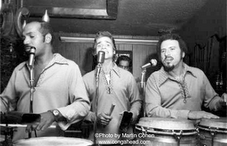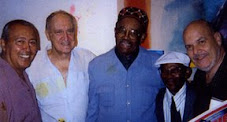 A visit to Staten Island's Meucci-Garibaldi Museum. Livelli pere was a fan.
A visit to Staten Island's Meucci-Garibaldi Museum. Livelli pere was a fan.
Vince's 88th Birthday
On April 9, 2008, Vincent gathered with friends for a "Testimonial Dinner" at the Pearl Oyster Bar in Greenwich Village, which occupies the building where the Cornelia St. Bookstore once stood. Vincent owned the shop with his good friend, the literary critic Anatole Broyard. What follows is Vince's address:
"Sixty years ago, Greenwich Village was a nice quiet neighborhood. We went to war as kids and came back as men, more mature but still unsophisticated and unpolished, in spite of our overseas exposure. Even with its bohemian background of poetry circles, speakeasies, rebellious antecedents and whispers of free love, we were young and innocent in many ways—especially where art and literature were involved.
One man’s dream, a bookstore, put a roof over what went on and became a kind of family kitchen for the cultural nourishment of young local artists and writers who came in to sit around a potbellied stove talking of Proust, Celine and Kafka well into the dark hours of a cold winter night.
The Cornelia Street Bookstore, even though it failed after only eight months, had made us take notice of our vacuous knowledge of good literature. The idea of upgrading the level of our taste and familiarity with good reading was based on offering, not trashy pulp fiction, but the avant-garde, unknown authors such as Henri Michaux, European intellectuals, first editions, out-of-prints, signed copies, books of collectible value, rarities.
Anatole soon created a class of readers whose hunger now demanded quality. People were seen reading and carrying books or talking books on Washington Square Park benches. The bookshop failed, not for lack of funds, demand or location (Cornelia is rather hidden away, as streets go). It failed because Anatole was unable to provide the merchandise to stock his shelves that began to look like bare cupboards. In other words, the demand outgrew the supply of suitable books. To make things worse, Anatole was reluctant to part with his favorite tomes and became a serious collector rather than a dealer.
With the bookstore gone, he stored his precious collection in Sheri Martinelli’s apartment on Jones Street. When she discovered his other girlfriends, she vengefully shipped his books to Somers, New Jersey, until he would change his ways, she hoped. Such desperate holding hostage of his soul may have been resolved some way or other, but I never learned how.
Anatole’s customers followed him into the San Remo restaurant where we set up a literary salon as a replacement for the back room of the bookstore, When the Santini brothers heard us talking about d’Annunzio and Pirandello, Lorca and Boccaccio, we were made welcome. The new cultural impact we originated was to be usurped by the arrival of drugs. In Kafka Was the Rage, Anatole wrote “Books were our drugs.” He and I witnessed and bemoaned this detour of our country’s cultural history.
Today, with technology, you have the equivalent of the printing press. Use it to recapture the healthier, friendlier, freer universal societal climate that we earlier guys and gals installed sixty years ago here at number 18 Cornelia Street, before there was a national awareness for it, before Channel 13, Arthur C. and Catherine T., PBS, WGBH, NEA or the artists and writers colonies.
When my friend José Mangual’s birthday cake was set before him, he reversed the plastic “54,” making it “45” and making himself ten years younger. I can’t do that, at 88, nor would I do so if I could."
"Sixty years ago, Greenwich Village was a nice quiet neighborhood. We went to war as kids and came back as men, more mature but still unsophisticated and unpolished, in spite of our overseas exposure. Even with its bohemian background of poetry circles, speakeasies, rebellious antecedents and whispers of free love, we were young and innocent in many ways—especially where art and literature were involved.
One man’s dream, a bookstore, put a roof over what went on and became a kind of family kitchen for the cultural nourishment of young local artists and writers who came in to sit around a potbellied stove talking of Proust, Celine and Kafka well into the dark hours of a cold winter night.
The Cornelia Street Bookstore, even though it failed after only eight months, had made us take notice of our vacuous knowledge of good literature. The idea of upgrading the level of our taste and familiarity with good reading was based on offering, not trashy pulp fiction, but the avant-garde, unknown authors such as Henri Michaux, European intellectuals, first editions, out-of-prints, signed copies, books of collectible value, rarities.
Anatole soon created a class of readers whose hunger now demanded quality. People were seen reading and carrying books or talking books on Washington Square Park benches. The bookshop failed, not for lack of funds, demand or location (Cornelia is rather hidden away, as streets go). It failed because Anatole was unable to provide the merchandise to stock his shelves that began to look like bare cupboards. In other words, the demand outgrew the supply of suitable books. To make things worse, Anatole was reluctant to part with his favorite tomes and became a serious collector rather than a dealer.
With the bookstore gone, he stored his precious collection in Sheri Martinelli’s apartment on Jones Street. When she discovered his other girlfriends, she vengefully shipped his books to Somers, New Jersey, until he would change his ways, she hoped. Such desperate holding hostage of his soul may have been resolved some way or other, but I never learned how.
Anatole’s customers followed him into the San Remo restaurant where we set up a literary salon as a replacement for the back room of the bookstore, When the Santini brothers heard us talking about d’Annunzio and Pirandello, Lorca and Boccaccio, we were made welcome. The new cultural impact we originated was to be usurped by the arrival of drugs. In Kafka Was the Rage, Anatole wrote “Books were our drugs.” He and I witnessed and bemoaned this detour of our country’s cultural history.
Today, with technology, you have the equivalent of the printing press. Use it to recapture the healthier, friendlier, freer universal societal climate that we earlier guys and gals installed sixty years ago here at number 18 Cornelia Street, before there was a national awareness for it, before Channel 13, Arthur C. and Catherine T., PBS, WGBH, NEA or the artists and writers colonies.
When my friend José Mangual’s birthday cake was set before him, he reversed the plastic “54,” making it “45” and making himself ten years younger. I can’t do that, at 88, nor would I do so if I could."
Subscribe to:
Comments (Atom)

